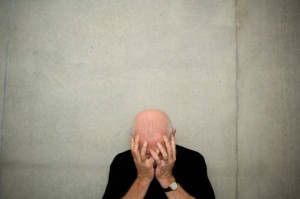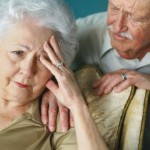Depression in the elderly causes slower response to treatment
 Antidepressant therapy may vary among the elderly with late-life depression as it becomes more difficult to treat the older the individual is. The study was published in JAMA Psychiatry which examined longitudinal patterns of changes in depressive symptoms in those who were prescribed antidepressant therapy.
Antidepressant therapy may vary among the elderly with late-life depression as it becomes more difficult to treat the older the individual is. The study was published in JAMA Psychiatry which examined longitudinal patterns of changes in depressive symptoms in those who were prescribed antidepressant therapy.
Lead author of the study Stephen F. Smagula said, “Elderly patients with late-life depression should get treated, that is the main take-home message from this study. You should get treated, and you should stay with it. Some of these patients take 12 weeks or more to fully respond. Late-life depression is often difficult to treat, and solo venlafaxine is just not going to cut it for a lot of the patients out there. But get treated, stay with it, and also explore adjunctive care or alternatives, as indicated.”
The study reports that nearly 50 percent of seniors with late-life depression have difficulties responding to initial antidepressant therapy.
For the research, which took place between August 2009 and August 2014, participants received antidepressant therapy which was upped to 300 mg/day over the course of 12 weeks. They found that late-life depression was difficult to treat, and there were different responses to the antidepressant therapy.
Almost half of the participants showed responses to the treatment, but there were three subgroups who did not respond to treatment. Two of the subgroups had high baseline depression levels and the other had moderate baseline depression levels. Dr. Smagula added, “This finding suggests that despite older age and depressive illness, relative preservation of retention ability, which is associated with hippocampal function, may facilitate a rapid response. This hypothesis is consistent with prior evidence linking hippocampal volume to late-life depression treatment outcomes.”
Researchers commented that late-life depression is difficult to treat because depression among the elderly is not well studied. Commenter of the study Dr. Robert Roca added, “It is clear that depression severity by itself does not reliably predict antidepressant response among older adults. Much work remains to be done. We may ultimately be disappointed in our quest to discover robust clinical predictors of response and in the end may need to look to biomarkers for guidance.”
Old age and depression
 With the rise of illness, disability and other life changes through the aging process, late-life depression affects many seniors. Chronic depression in the elderly can have both mental and physical consequences which can, in turn, worsen underlying medical conditions.
With the rise of illness, disability and other life changes through the aging process, late-life depression affects many seniors. Chronic depression in the elderly can have both mental and physical consequences which can, in turn, worsen underlying medical conditions.
It is reported that late-life depression affects nearly six million seniors over the age of 65, yet only 10 percent ever receive treatment for it. The problem surrounding late-life depression in the elderly is that symptoms are often confused with other diseases and ailments, so misdiagnosis is common.
Depression in the elderly differs from depression in younger adults because it increases their risk of heart failure, cardiac disease and death from other illnesses. Furthermore, suicide rates are also higher among white males with late-life depression, nearly double when compared to that of the general population.
Symptoms of depression in the elderly
For successful early diagnosis of late-life depression it’s important to recognize the symptoms in elderly people, to not confuse them with other ailments. Symptoms of depression in the elderly include:
- Sadness
- Fatigue
- Lost interest in activities or hobbies
- Social withdrawal or isolation
- Weight loss or loss of appetite
- Difficulties sleeping, staying asleep
- Loss of self-worth
- Increased use of alcohol or other substances
- Fixation on death, suicidal thoughts
- Anxiety and irritability
- Aches and pains
- Memory problems
- Lack of motivation or energy
- Slowed movement or speech
- Loss of interest in socializing
- Feeling hopeless or helpless
- Neglecting personal care (hygiene, feeding oneself, forgetting medications)
Causes and risk factors of depression in the elderly
 There are many causes and risk factors which put the elderly at higher risk for late-life depression. With all the changes resulting from aging, causes and risk factors of depression in the elderly include:
There are many causes and risk factors which put the elderly at higher risk for late-life depression. With all the changes resulting from aging, causes and risk factors of depression in the elderly include:
- Health problems, like a pre-existing illness or disability
- Loneliness or isolation
- Reduced sense of purpose – no longer working or taking care of family members
- Fears – of dying, financial instability, health issues
- Recent bereavements
- Being single, unmarried or widowed
- Lack of social support or social interactions
- Stressful life events
- Medications
- Family history of major depression
- Chronic pain
Preventing and self-help tips for depression in the elderly
Late-life depression doesn’t have to affect you simply because you are getting older. Preventative measures can be taken in order to avoid or lower a person’s risk of developing late-life depression. Prevention and self-help tips for depression in the elderly involve:
- Creating a social support group – volunteering at churches or in the community, calling up loved ones, going to visit friends and family
- Exercising – exercise has been shown to have positive mood-boosting effects
- Recognizing stress triggers and reducing them or creating coping strategies
- Reaching out for help when you feel overwhelmed, lonely or helpless
- Getting enough sleep – if you have a condition which prevents or hinders sleep speak with a doctor to combat this
- Maintaining a healthy diet – there are many foods which have mood-boosting effects
- Getting a pet
- Learning a new skill
- Laughing more
- Becoming aware of physical limitations – don’t try to partake in activities which go beyond your limitations as you increase your risk to “fail” which can contribute to depression.
The older you become the more your risk goes up to develop late-life depression, but with simple preventative techniques you can continue to enjoy a happy, fulfilled life.
Treat depression after heart attack
A heart attack occurs when there is not an adequate blood supply to the heart. This can be caused due to a blockage. Damage can occur in the heart, and depending on how long the heart goes without blood will determine the severity of the damage. Continue reading…
-
Is It Water Loss Or Fat Loss
The problem with many weight loss supplement formulas sold today is th
-
Win The Battle Of The Bulge With This Advice
If your goal is to shed some of those extra pounds, you have to
-
Eat Starch, Lose Weight
by guest blogger John McDougall, MD, author, internist, and T
-
Lose Extra Pounds By Using These Terrific Recommendations
You are certainly not an oddity if you
-
Q&A: Does Skinny Fiber Really Work?
Q: What is Skinny Fiber? – Evelyn K. LIKE BlackDoc
-
How To Improve Your Health In 14 Days Small Changes For Maximum Health Weight Loss
Many Americans include health improvement in their New Years Resolutio
- DON'T MISS
- Eat Flat Stomach Foods To Lose Stomach Fat In Your 50s
- Benefits of the Glycemic Index Diet
- Processed Foods Are Certainly Not Healthful
- You Can Have The Body Of A Fitness Model!
- Complete Reference On Safe Weight Loss
- Is Acomplia your ultimate obesity solution?
- 5 Cruel Foods Part of Normal Diets
- What Is The Thought Loop That Panic Away Talks About?
- Lowering Cost of Diets with Nutrisystem Discounts and Medifast Coupons
- Finding Tasty Paleo Diet Recipes




